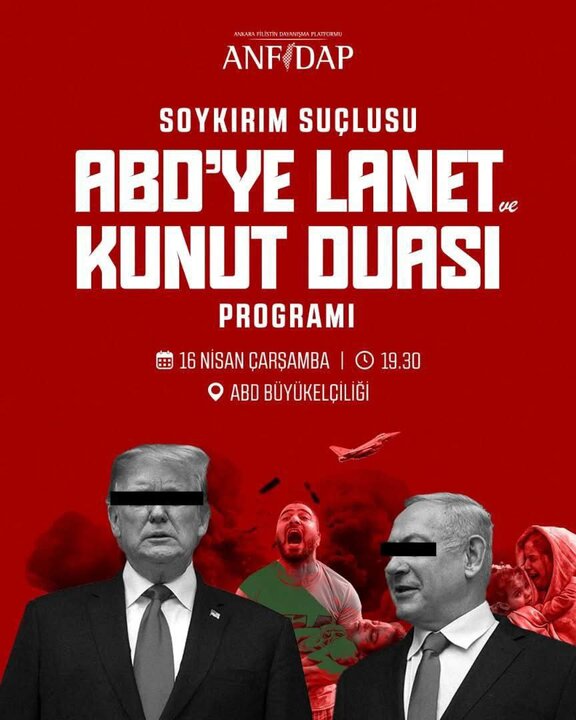
TEHRAN - Netanyahus journey to Washington came on the heels of a four-day visit to Hungary, where he was hosted by Prime Minister Viktor Orban, a vocal critic of the ICC.
Hungary, despite being an EU member and theoretically obligated to enforce ICC warrants, openly defied the courts authority, allowing Netanyahu to attend without risk of arrest.This pattern of selective non-compliance with international law set the stage for his United States visit, where the absence of ICC jurisdiction similarly shields him from legal repercussions.The timing of the trip is significant.
It follows a period of heightened tension in the Israel-Hamas conflict, with Israel expanding its military operations in Gaza and facing global criticism.
The ICCs warrant, issued on November 21, 2024, accuses Netanyahu and his former war minister Yoav Gallant of war crimes, including starvation as a method of warfare and crimes against humanity such as murder and persecution.
The courts decision was met with fierce opposition from Israel and its allies, including the United States , where President Joe Biden called it outrageous in 2024, and the incoming Trump administration, which imposed sanctions on ICC personnel in February 2025.While the ICC warrant dominates international headlines, Netanyahu faces equally pressing domestic challenges, most notably his corruption trial in Israel.
As of March 2025, Netanyahu has been embroiled in legal proceedings in Tel Aviv, where he stands accused of bribery, fraud, and breach of trust in three separate cases.During his April 6 visit to Washington, Netanyahus domestic legal woes were momentarily overshadowed by international diplomacy, but they remain a critical factor in his political survival.
The trial has fueled protests in Israel, with thousands demanding his resignation and accusing him of prioritizing personal gain over national interest.
Critics argue that his foreign trips, including to Hungary and now the United States , are attempts to divert attention from these domestic pressures and bolster his image as a global leader unafraid of international criticism.Therefore, Netanyahu's visit to Washington can be seen as a strategic endeavor aimed at addressing several pressing issues that are pivotal to Israel's national interests.Talks on Iran and Gaza at the center stageBeyond economic concerns, Netanyahu's visit encompasses critical regional security issues.
Discussions with President Trump addressed tensions with Iran, the ongoing conflict in Gaza.
The urgency of these talks is underscored by the recent deployment of advanced United States missile defense systems to Israel, including THAAD and Patriot batteries, amid heightened regional tensions.Trump told reporters on Sunday: Were going to talk about trade, and were going to talk about the obvious subject.
You know what the obvious subject is, right? According to media sources, this was interpreted in Israel as likely referring either to the prisoners held in Gaza or to Irans nuclear program.Strategies to solve Gaza war, prisoners' issueIn recent months, tensions in Gaza have escalated significantly.
On April 6, 2025, in response to "massacres" by Israel in Gaza, Hamas launched several rockets into southern Israeli cities.
In retaliation, the Israeli military conducted airstrikes on targets in Gaza, resulting in the deaths of at least 39 people.According to reports, Israel has expanded its control over more than 50% of the Gaza Strip by establishing buffer zones.
This move has led to widespread destruction of Palestinian homes, agricultural land, and infrastructure.
Some analysts have described these actions as potential ethnic cleansing and war crimes.During the meeting, Netanyahu and Trump would likely discuss a proposed plan for the future of Gaza.
The plan involves the relocation of more than 2 million Palestinians from Gaza and the development of the area into a tourist destination.
The proposal has faced widespread criticism, with many condemning it as a violation of international law and an act of ethnic cleansing.Among the actions of opposition against Netanyahu's violent policy in Gaza, the protest demanding a ceasefire in Gaza and a prisoner exchange deal on his arrival in Washington, DC can be mentioned.The meeting occurred amid growing international concern over the escalation of violence in Gaza and its humanitarian impact.
Human rights activists and international organizations have called for an immediate halt to the violence and the initiation of peace negotiations.Diverging paths of Trump and Netanyahu on IranThe Iran question is the linchpin of Netanyahus United States visit and reveals both the alignment and friction between the two leaders.
Both Trump and Netanyahu share the goal of neutralizing what they perceive as Irans threat to regional stability and their respective national interests.
However, their strategies, timelines, and underlying motivations diverge significantly, raising questions about the feasibility and consequences of their collaboration.Netanyahus arrival in the United States on April 6 came at a pivotal moment for both Israel and the Middle East.
Since Trumps return to office, his administration has signaled a return to the "maximum pressure" policy against Iran, a strategy first employed during his first term, which involved stringent sanctions and a withdrawal from the 2015 Joint Comprehensive Plan of Action (JCPOA).
For Netanyahu, who has long claimed Iran is an existential threat, Trumps presidency represents an opportunity to align United States policy more closely with Israels hawkish stance.
The Israeli leaders visit, therefore, was not merely a diplomatic courtesy but a strategic play to solidify United States support for potential military action against Iran.The Iran question is the linchpin of Netanyahus United States visit and reveals both the alignment and friction between the two leaders.
Both Trump and Netanyahu share the goal of neutralizing what they allege as Irans threat to regional stability and their respective national interests.
However, their strategies, timelines, and underlying motivations diverge significantly, raising questions about the feasibility and consequences of their collaboration.He has consistently claimed that Iran seeks to destroy Israel, citing Tehrans backing for the Axis of Resistance.
Trump, meanwhile, sees Iran as a destabilizing force in West Asia that undermines United States interests, particularly its oil exports and influence in the region.
During his first term, Trump withdrew from the JCPOA, imposed severe sanctions, and authorized the assassination of Iranian General Qassem Soleimani, actions that Netanyahu applauded as decisive blows.Despite their alignment on goals, Trump and Netanyahu differ on tactics, timing, and the role of the United States in any confrontation with Iran.
Netanyahu, facing domestic pressure from his far-right coalition partners and a public weary of prolonged conflict, appears eager to escalate military action against Iran sooner rather than later.Trump, however, has signaled a preference for negotiation over immediate military engagement, at least initially.
In April 2025, he expressed openness to direct talks with Iran, arguing that intermediaries slow down progress.
This stance contrasts with Netanyahus skepticism about diplomacy, as the Israeli prime minister believes any deal with Iran would be a repeat of the JCPOA, which he and Trump both derided as insufficient.
Furthermore, Trumps domestic challenges, tariff disputes, economic volatility, and political polarization may make him cautious about launching another West Asia conflict, especially given his campaign promises to avoid foreign wars.Bigger picture, question of narrativeNetanyahus trip to Washington is more than a diplomatic engagement; it is a high-stakes gambit by a leader facing unprecedented challenges.
By aligning with Trump and defying the ICC, he seeks to project strength and impunity, but this strategy comes at a cost.
Domestically, his corruption trial and public discontent could erode his power base.
Internationally, his refusal to engage with the ICC risks further isolating Israel and alienating allies who value multilateralism.The visit also highlights the fragility of global justice mechanisms in the face of geopolitical power.
While the ICCs warrants are a symbolic victory for accountability, their lack of enforcement power reveals the limits of international law when confronted with determined resistance from powerful states and their allies.
For Netanyahu, the trip may offer temporary relief, but the long-term consequences remain uncertain.As the world watches, the question remains: Can a leader accused of war crimes and corruption continue to evade justice, or will the weight of international and domestic pressure eventually force accountability?

 18
18













